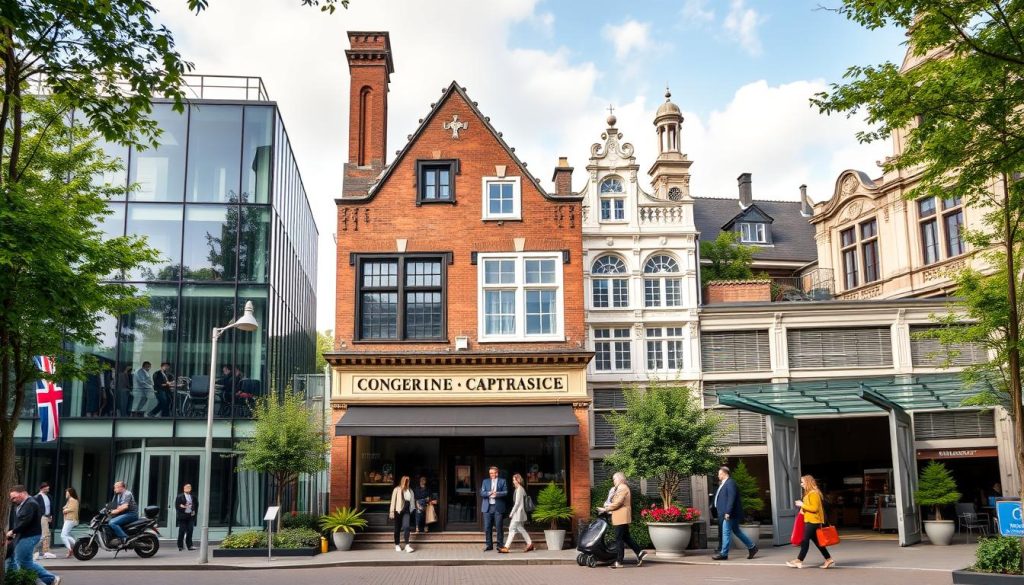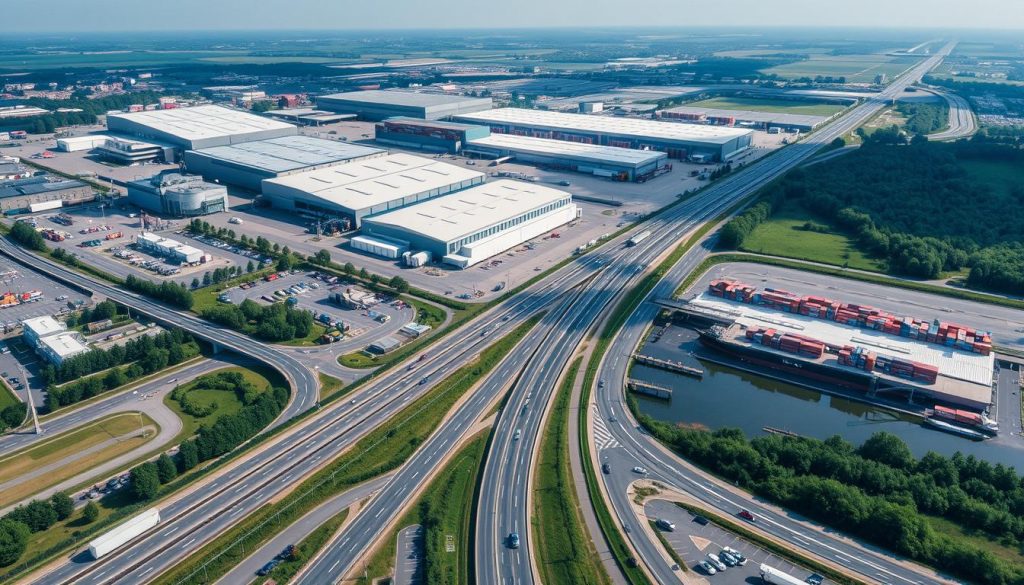Welcome to our guide for UK businesses looking to enter Belgium’s dynamic market. It’s crucial to grasp the details of doing business here. This includes the legal system, tax rules, and cultural differences. Belgium, as a key entry point to Europe, is full of chances for UK companies to grow.
In this guide, we’ll cover the essential parts of the Belgian market. We aim to help you make the most of the opportunities Belgium has to offer.
Introduction to Belgium’s Business Landscape

Belgium is a key player in international business, right at Europe’s heart. It has a well-built infrastructure, making it easy to connect with other countries and markets. Brussels, the capital, is home to the European Union, making it a prime spot for big companies.
The country’s stability makes it a great place for investments. Belgium’s economy is strong, thanks to various sectors like manufacturing, services, and tech. It’s ranked high in ease of doing business, offering a good setup for foreign investors.
For UK businesses looking to grow, Belgium is a great choice. The government offers tax breaks and grants to attract and keep foreign companies. This makes Belgium a top spot for business ventures.
Understanding the Belgian Market

The Belgian market is full of opportunities for UK businesses looking to grow. Knowing about GDP, employment rates, and inflation is key. It helps understand if entering this market is a good idea.
Key Economic Indicators
Belgium’s economy is growing steadily, with a strong GDP. The latest figures show a 1.6% GDP growth rate. This shows the country’s ability to stay strong even when the world’s economy is shaky.
Employment rates are also improving, with a 4.5% unemployment rate. This is a sign of recovery after the pandemic.
- GDP growth rate: 1.6%
- Current unemployment rates: 4.5%
- Inflation rate trends: influencing purchasing power and business costs
Market Opportunities for UK Enterprises
Belgium offers many chances for UK businesses in different sectors. Technology, logistics, and sustainability are particularly promising. These areas are looking for new ideas and sustainable solutions.
- Technology: driven by digital transformation
- Logistics: benefitting from Belgium’s strategic location in Europe
- Sustainability: aligned with global environmental goals
Working with local businesses can help UK companies succeed in Belgium. By using Belgium’s economic data, UK businesses can make smart choices about investing here.
Legal Framework for Businesses in Belgium

The legal rules for businesses in Belgium are detailed and wide-ranging. It’s key to grasp Belgian business law to run smoothly and protect interests. This is crucial for success in the market.
Following the rules is a must. Companies need to focus on several important areas. These include:
- Company Formation: Registering correctly and following corporate laws is essential for setting up a legal entity.
- Taxation: Knowing local tax rules and benefits is important for making profits.
- Consumer Protection: Laws to protect consumers can boost your brand’s image and gain customer trust.
Legal matters also cover employment laws and health and safety. These are vital for a happy and productive team. Any UK business looking to enter the Belgian market must understand these to avoid risks and seize chances.
Company Formation in Belgium

Starting a business in Belgium means knowing the different types of companies. Each has its own benefits and drawbacks. For UK businesses setting up in Belgium, picking the right company type is key. It must match their goals and how they plan to operate.
Types of Business Entities
In Belgium, you can find several types of companies:
- Sole Proprietorship: One person runs the business, with full control but all the risks.
- Partnership: More than one person shares profits and duties, with different types like general and limited partnerships.
- Private Limited Liability Company (BV): Good for small to medium businesses, it limits the liability of shareholders.
- Public Limited Liability Company (SA): Best for big businesses, it lets shares be traded publicly and limits liability.
Knowing about these types helps UK companies choose the right one for them.
Step-by-Step Registration Process
Registering a company in Belgium is a step-by-step process. Here’s how to set up your business:
- Choose the Business Structure: Pick the best company type for your needs.
- Draft the Articles of Association: Write the main document that outlines the company’s rules.
- Notarise the Documents: Get a notary to approve the articles.
- Register with the Crossroads Bank for Enterprises: Get a unique number for legal recognition.
- Open a Business Bank Account: Put the needed start-up capital in a Belgian bank.
- Register for VAT: If needed, sign up for VAT at the local tax office.
This process makes sure you follow Belgian laws, helping you set up your business smoothly.
Taxation in Belgium

It’s key for businesses in Belgium to know about tax rules. These rules cover corporate tax rates, VAT, and tax breaks for foreign investors. This part explains these points, helping UK companies thinking about Belgium.
Corporate Tax Rates
Belgium’s corporate tax rates have changed a lot lately. The main rate is 25%. But, small and medium businesses with income under €100,000 pay 20%.
Businesses in Belgium must follow strict tax rules. This can affect how well they run. They need to plan their taxes carefully to save money. Knowing these rates helps UK companies make smart choices in Belgium.
Value Added Tax (VAT) Regulations
VAT in Belgium has clear rules. The standard rate is 21%. Some items and services get lower rates of 6% and 12%.
Companies doing business must register for VAT. Not doing so can lead to fines. Knowing VAT rules helps businesses set prices right and follow tax laws.
Tax Incentives for Foreign Investors
Belgium has tax breaks to draw in foreign investors. These include special rules for innovation, research, and creating jobs. UK companies looking to invest will find these incentives appealing.
These incentives make doing business in Belgium more attractive. They help improve profits and market standing. By using these incentives, businesses can do better in Belgium.
Employment Laws and Practices

For UK businesses in Belgium, knowing the employment laws is key. The rules cover contracts, working hours, and what employees are entitled to. It’s crucial for both local and expat workers.
Key Employment Regulations
Belgium’s employment laws have several important rules. These include:
- Mandatory written contracts detailing the terms of employment.
- Regulations governing work hours, with limits on weekly working time.
- Provisions for health and safety in the workplace.
- Legal obligations regarding notice periods for termination of contracts.
Understanding Employee Benefits and Rights
Belgium offers many benefits to protect workers. Some of these are:
- Health insurance coverage.
- Pension contributions to secure long-term financial stability.
- Holiday allowances to ensure adequate rest.
Knowing these laws helps UK firms create fair work environments. It supports employee rights and boosts morale.
Financial Regulations and Banking

For UK businesses wanting to start in Belgium, knowing the financial scene is key. A crucial step is getting a business bank account. This helps with managing money and running the business. Belgium has its own rules for banking that need to be followed for a smooth setup.
Opening a Business Bank Account
Getting a business bank account in Belgium needs careful planning and following local rules. Here’s what you need to do:
- Choose a Banking Partner: Look for banks that fit your business needs. Think about fees, services, and how easy it is to get to the bank.
- Gather Required Documentation: You’ll need ID, business registration, and a brief on your business plans.
- Complete Bank Application: Fill out the bank’s forms carefully. Make sure all details are correct to avoid hold-ups.
- Deposit Initial Capital: Most banks ask for a starting deposit. Check what each bank requires.
- Receive Account Confirmation: Once your application is approved, the bank will tell you about your new account.
By following these steps, opening a business bank account becomes easier. Having a good banking relationship is vital for UK companies in Belgium. It’s especially important for those looking to grow their financial activities in the area.
Cultural Considerations When Doing Business

It’s key to know the Belgian business culture for teamwork and networking. Belgium’s culture is a mix of French, Dutch, and German influences. Understanding these differences is vital for business success.
Language is important in communication. English is common in business, but knowing French or Dutch helps. Using titles and surnames shows respect and follows local customs.
Belgians are punctual and like structured meetings. Being on time and sticking to the agenda shows respect. Knowing local customs helps in smooth negotiations and teamwork.
Networking in Belgium is different from other places. Building trust takes time and effort. Casual chats over coffee or lunch are great for making connections.
By understanding Belgian business culture and its differences, you can have successful interactions with local people.
Networking and Business Etiquette in Belgium

In Belgium, networking is key to building strong relationships. These relationships are vital for success. It’s not just about making deals; it’s about creating lasting connections that help businesses grow and work together.
Getting to know local people can really help a UK business succeed here. This vibrant place offers many opportunities for growth.
Building Relationships in Business
To build strong relationships in Belgium, you need to understand the culture and plan carefully. Here are some important points to remember:
- Join local networking events and business groups.
- Use social media for business networking in Belgium.
- Be patient; building trust takes time.
- Follow up after meetings to keep connections strong.
Common Business Practices
Business etiquette in Belgium is all about being professional and respectful. UK businesses should follow these key practices:
- Book meetings in advance and be on time.
- Use formal greetings, like titles and last names.
- Understand the indirect way of communication; subtleties are important.
- Adjust to the negotiation style, which often seeks agreement.
Business Infrastructure and Logistics

Belgium has a well-developed infrastructure that boosts logistics. This is key for businesses wanting to succeed in Europe. Its location is strategic, making it a gateway to Europe’s big economic areas.
The transport systems in Belgium are top-notch. They have a strong network of roads, railways, and waterways. This makes moving goods easy. Ports like Antwerp and Zeebrugge are major hubs for global shipping, handling lots of cargo.
Belgium keeps improving its infrastructure. It invests in modern transport links and supply chain efficiency. Businesses get to use the latest logistics tech. This includes real-time tracking and data analytics, making operations better.
- A variety of transportation options, including:
- Roadways for fast delivery
- Railways for cost-effective bulk transport
- Waterways for large-scale shipping
- Strong connection to European rail and road networks
- Investment in sustainable logistics practices
These factors make Belgium a great spot for UK businesses to grow in Europe. It offers better supply chain efficiency. This can save costs and boost competitiveness globally.
Technology and Innovation Hubs

Belgium is a key player in technology and innovation. It has many tech hubs that help different sectors grow. These hubs offer resources and collaboration, essential for progress. For UK businesses, joining these hubs is a great chance to work on new projects and partnerships.
Key Industries Leading Innovation
Several Belgian industries lead in innovation, showing the country’s tech prowess:
- Pharmaceutical Technology: Known for its advanced research, Belgium hosts global pharmaceutical giants. They are always pushing medical science forward.
- Automotive Industry: Focused on green solutions and new manufacturing, this sector is a big player. It’s leading the way for electric and self-driving cars.
- Digital Solutions: IT and digital transformation are big here. This sector is driving new software and tech solutions to tackle today’s business issues.
These tech hubs in Belgium boost the economy and attract UK businesses. They offer a chance for innovation and collaboration. This can lead to big wins for both local and global markets.
Navigating Trade Regulations

UK businesses going into Belgium need to know the trade rules for moving goods. These rules help make cross-border deals smoother and follow local laws better. Important things to look at include permits, customs rules, and tariffs.
Import and Export Guidelines
For successful trade in Belgium, UK companies must follow certain steps. Here are key points to remember:
- Get the right trade permits, which depend on the goods type.
- Know the customs rules, like needing invoices and certificates of origin.
- Understand trade tariffs, as they can change the cost of goods.
- Stay updated with Belgium’s trade laws, as they can change due to politics and economy.
- Think about working with a customs broker to make trade easier.
Environmental Regulations for Businesses

In Belgium, environmental laws are key for businesses. They must follow rules to protect the environment and promote sustainability. These laws cover waste, pollution, and saving resources.
Companies in Belgium must know the rules for their industry. Following these laws is not just a must; it also boosts a company’s image. Knowing these rules well can make operations smoother and cheaper.
Some important environmental rules for businesses include:
- Limits on emissions and discharges from manufacturing processes.
- Strict guidelines for the management and disposal of hazardous waste.
- Encouragement of energy efficiency and the use of renewable resources.
To follow sustainability practices, companies should make an environmental plan. This plan helps them manage their environmental impact and follow Belgium’s laws.
Understanding the Political Landscape

The political scene in Belgium greatly shapes the business world. Being a founding EU member, Belgium’s rules are heavily influenced by EU laws. This affects market practices and business chances in the country.
The Role of the EU in Belgian Business
EU rules shape trade, environmental policies, and consumer safety in Belgium. Businesses must keep up with these regulations. The EU’s influence on Belgium’s government makes it a special place for entrepreneurs. Important points include:
- Following EU standards can change how you make products and their quality.
- Joining EU-backed programs can boost innovation and growth.
- EU decisions can quickly change market conditions.
Being part of the EU is good for Belgian businesses. It offers a stable setting for growth. This stability can boost market confidence and open up new investment chances for UK firms.
Challenges of Doing Business in Belgium

Starting a business in Belgium can be tough for UK companies. It’s important to know these challenges to succeed and make a profit.
Language barriers are a big issue in Belgium. The country speaks Dutch, French, and German. This makes talking to locals or government hard. Companies might need to hire people who speak both English and one of these languages.
Following local rules is another big challenge. Belgium’s laws can be complex. Getting help from local lawyers can make it easier to follow these rules.
The market in Belgium is very competitive. There are many businesses in different areas. UK companies need to do their homework to find their place in the market.
- Use local talent to help with language issues.
- Get advice from local lawyers to follow the rules.
- Do deep research to find new opportunities.
In short, while there are obstacles, UK businesses can do well in Belgium. Knowing the challenges and planning ahead can help a lot.
Doing Business in Belgium

Belgium is a key spot for UK companies wanting to grow in Europe. Its varied economy, good business climate, and EU heartland position open up big chances for success. Real stories from UK firms show how they’ve grown and faced hurdles.
Success Stories from UK Companies
Many UK companies have made it big in Belgium, showing different ways to succeed there.
- Unilever: This giant in consumer goods bases its European operations in Belgium. It focuses on new ideas and being green. Its ability to deal with local rules and tastes has helped it keep doing well.
- AstraZeneca: AstraZeneca uses Belgium’s top research spots to grow its R&D. It works closely with local groups, leading to big health breakthroughs.
- Jaguar Land Rover: Jaguar Land Rover set up a factory in Belgium. It benefits from the country’s skilled people and strong transport links. This shows the car industry’s potential in Belgium.
These UK firms in Belgium teach us important lessons. They’ve adapted to local markets, teamed up, and invested in people. Their stories show the growth chances and guide future investors and businesses in Belgium.
Resources and Support for UK Businesses in Belgium
UK businesses looking to set up in Belgium have many resources at their disposal. UK Trade and Investment (UKTI) offers detailed guidance for entering foreign markets. They help with market research, professional connections, and navigating regulations.
Trade associations like the British Chamber of Commerce in Belgium are also key. They provide networking chances and insights into local business practices. Joining these groups gives businesses access to valuable resources and support, helping them understand the Belgian market better.
Consultancy firms specialising in international trade offer customised help for UK companies in Belgium. They assist with local laws, employment, and taxes. Getting expert advice helps businesses run smoothly and grow stronger in Belgium.

